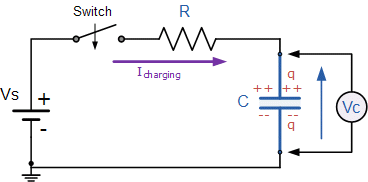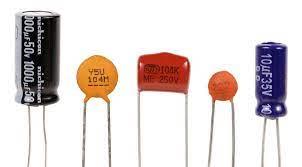Last Updated on October 22, 2023 by Kevin Chen
Image source electronics tutorials
When buying a capacitor, there are various technical parameters that you should consider. One of them is the final charge. We can define the final charge of a capacitor as the charge stored in the capacitor when both the voltage and the charge attain a steady state.
Capacitors are electronic components designed to store electric charges. They get this energy during the charging process. If there is no interference at the power source, electric charges will continue flowing into the capacitor until it becomes fully charged.
At that point, the charge will have the same value as the voltage source, that is why we call it a steady state. The electric charges on the plate of the capacitor at this point is what we are calling the final charge.
It is possible to estimate and even get the actual value of the final charge which is usually measured in coulombs (C.) When buying a capacitor, you should choose one that has the highest final charge. It will have a bigger capacity to store electric energy.
Also, keep in mind that there are numerous factors that determine the final charge of a capacitor. One of the main factors is capacitance. The larger the capacitor, the higher the final charge.
While at it, keep in mind that capacitors come in different sizes, and each size is suitable for different application areas. So, beyond looking at the final charge, you should ask yourself if its capacitance will be able to support the smooth running of your electronic device.
What is the importance of the final charge?
You should pay full attention to the final charge as it defines the energy capacity of the capacitor when it is fully charged. You will use this parameter to gauge the storage and running capacity of your capacitor. This is because when in operation, devices tend to draw energy from the capacitors.
Also, knowing the final charge will help you determine how long a device should run. You will know the number of charges that a device will drain from the capacitor for a given period and even design plans on how to mitigate the loss of energy.
How to calculate the final charge?
You don’t have to check the datasheet to know the final charge of a capacitor. With simple calculations, you will get the actual value.
To calculate the final charge, you will use the formula:
Q=C*V
Where;
Q= final charge
C=Capacitance
V is the voltage source that is charging the capacitor
Let’s put the above formula into practice by using some real values.
In our case, the capacitance is 20 microfarads and our power source is rated 24 volts.
The final charge of the capacitor (Q)= 20 *24= 480 microcoulombs.
From the formula above, you can tell that there are two key factors that determine the final charge; capacitance and voltage. The introduction of a resistor to the circuit is likely to lead to a lower charge. In fact, the higher the resistance the lower the final charge.
What is the final capacitor voltage?
The final capacitor voltage is the voltage of a capacitor when it attains the full charge. Keep in mind that capacitors are energy storage devices hence they also have voltage ratings. So, when the capacitor is full, it will have attained the final voltage.
Just like for the final charge, the final capacitor voltage also depends on the capacitance and the voltage source. The resistance of the circuit is another key factor that determines the final voltage.
To calculate the final capacitor voltage, you will use this formula:
Vc= Vb ×(Rt/(Rt+Re))
Where Vf is the final capacitor voltage, Vb is the voltage of the battery or any other voltage source, Rt is the total resistance of the charging circuit and Re is the effective resistance of the capacitor.
In most cases, the final voltage capacitor is very close to the voltage source. If you are using a 12 volt battery, use it in the above calculation and the final capacitor voltage will be around 11.9 volts.
What is the charging current of a capacitor?
The charging current of a capacitor refers to the flow of electric charges or electrons from the voltage source into the capacitor.
When you connect a capacitor to the voltage source, electric current will flow from the source, through the circuit to the capacitor’s plate.
The voltage of the source is directly proportional to the rate at which current flows from the source to the capacitor.
In most cases, there are electronic components installed on the circuits to regulate the flow of this current. This is vital because overcurrent can lead to overheating and even damage the capacitor. Resistors are just some of the components designed to regulate the charging current.
Why is my final charge on the capacitor lower?
Probably you are keen on the performance of your capacitor and you have discovered that its final charge is lower than it used to be. There are various reasons for a lower final charge. One of them is the increased internal resistance in the circuit.
Current leakage is another possible cause of the lower final charge. This could be due to a problem on the circuit or the capacitor.
Buying the best capacitor for your needs
Image source Gadgetronix
At this point, you know what the final charge of a capacitor is and why it deserves your full attention when it comes to buying capacitors.
Other than the final charge, you should also look at the other factors such as the size and the quality of the capacitor that you want to buy.
One of the things that you should look at when it comes to buying capacitors is the source. Where you buy will always matter. Ensure that you buy from reputable and reliable capacitor suppliers in China. This way, you can be sure of the quality and integrity of the capacitor.
This rule applies whether you want to buy capacitors in bulk in China or you want to use for your electronic project.
The best suppliers always source from reputable manufacturers.
If you want to find more Electronic Components Distributors, please check out the following articles:
Electronic Components Distributors In the USA
Electronic Components Distributors In UK
Electronic Components Distributors In China
Electronic Components Distributors In India
Electronic Components Distributors In Singapore
Electronic Components Distributors In Malaysia
Electronic Components Distributors In Vietnam
Electronic Components Distributors In South Korea
- The Ultimate Guide to IRFZ44N MOSFET - April 30, 2024
- AMD Ryzen 5 vs Intel i5: How to Choose the Right Processor? - April 30, 2024
- Where to buy IC chips? The Best Guide? - March 26, 2024






